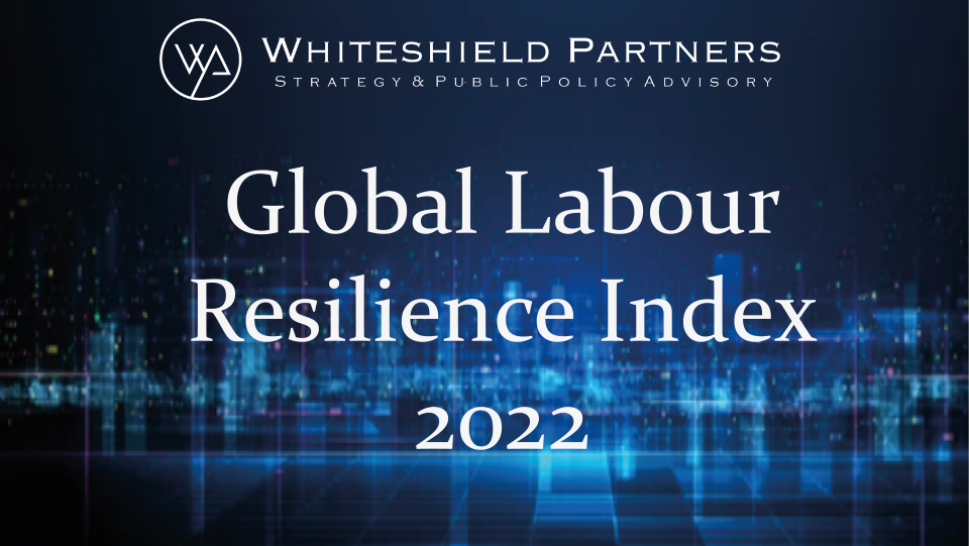In collaboration with our CEMS Corporate Partner Whiteshield Partners, a global strategy and public policy advisory firm, we are happy to introduce the Global Labour Resilience Index (GLRI) 2022.
The online launch of the GLRI included panellists from the International Labour Organization (ILO), Asian Development Bank, Cornell University and Emirates NBD. In addition to the launch of the GLRI, a separate report conducted in collaboration with the ILO on resilience, trade and employment will be published later this month.
The index ranked 145 countries in terms of their resiliency in labor markets, policies, and key capabilities to face crises such as COVID-19, technological disruptions, and transition to a green economy.
The GLRI 2022 gauged which countries are most prepared for the future of employment. Alongside structural vulnerabilities, the report ranked countries on their ability to mitigate crises, recover, create jobs, and align themselves with future trends.
Nine out of the top ten most resilient countries are European countries, with Singapore as the only country outside of the region on the list. The report revealed that these countries have open trade economies and multiple trading partners. Further, these resilient labour markets are characterized by robust educational systems, high quantity and quality of jobs, inclusivity and equality, innovations, and they foster macroeconomic stability.
Denmark ranked first as the world’s most resilient labour market, followed closely by Switzerland, Germany, and the Netherlands. European countries recorded an average resilience gap of zero which translates to a strong and balanced performance across all the sub-indicators.
On a regional level, North America ranked first on the Index. The United States landed on the 15th spot with Canada ranking 16th, both indicated a fall on their rankings over the last five years. The report also stated the need for North America to focus on enhancing its structural indicators such as economic complexities, inclusivity in the workplace, and upskilling the labour workforce.
The USA recorded the highest in terms of adaptive capabilities and has managed to recover from near collapse to stronger labour markets. However, in a global level, there is notable unequal recovery rates from the economic disruptions brought about by the Covid-19 pandemic. This is driven by the inability to balance country’s capabilities.
The Middle East and North Africa (MENA) ranked 5th regionally, with notable gaps between countries with robust economies and those affected by internal conflicts. Latin America and the Caribbean ranked 6th, with data showing that it has dropped on the scores while other regions showed improvements. To address this, the region must focus on equality and inclusivity in the labour markets.
The stagnation in resilience has caused number of countries to be left behind, which was notable in Sub Saharan Africa. Over 70 per cent of countries in the region ranked lower than 100th.
Fadi Farra, Founder and Partner at Whiteshield Partners and CEMS Alumnus (LSE/ HEC 1997), emphasized: “Crises like the Covid-19 pandemic have prompted decisive actions to reduce gaps in labor markets. Policymakers need to transform temporary or short-term fixes into structural changes as we move towards the recovery phase. This will ensure systems are more resilient should there be future disruptions.”
Nobel Prize Winner in Economics Sir Christopher Pissarides, Special Advisor & Director at Whiteshield Partners, said: “The GLRI assesses the resilience of labour markets and highlights priority areas to strengthen resilience. One notable urgency is the need for both the public and private sectors to work together in developing and implementing strategic policy reforms to address long-term impacts of any disruption in labour markets.”
Anthony O’Sullivan, Partner and Director at Whiteshield Partners, noted: “The report reveals which countries are most vulnerable to labour market shocks and long-term disruptions and those who are more resilient. Countries or economies with the widest gap between the scores on both long-term and short-term factors have more potential to improve through shorter term policy reforms.”
Whiteshield Partner’s GLRI is launched annually in Davos and provides a guide for the public and private sectors in developing policies to improve employment-related inclusivity and increase efforts in building a resilient labor market, particularly in unforeseen economic, social, or health-based crises.
The full report and country statistics are available on www.whiteshieldpartners.com, and for more information or press inquiries, please get in touch with GLRI@whiteshieldpartners.com or media@whiteshieldpartners.com.




